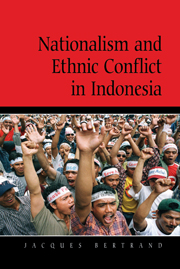Book contents
- Frontmatter
- Contents
- List of figures and tables
- Preface
- Maps
- 1 Introduction
- 2 Critical junctures, nationalism, and ethnic violence
- 3 The national model and its institutional history
- 4 Exclusion, marginality, and the nation
- 5 Islam and nation: The Muslim–Christian dimension
- 6 The escalation of religious conflict
- 7 Conflict in Maluku
- 8 Late integration into the nation: East Timor and Irian Jaya (Papua)
- 9 Aceh's ethnonationalist conflict
- 10 Autonomy as a solution to ethnic conflict
- 11 Unity in diversity
- Notes
- Glossary
- Bibliography
- Index
- CAMBRIDGE ASIA–PACIFIC STUDIES
10 - Autonomy as a solution to ethnic conflict
Published online by Cambridge University Press: 10 December 2009
- Frontmatter
- Contents
- List of figures and tables
- Preface
- Maps
- 1 Introduction
- 2 Critical junctures, nationalism, and ethnic violence
- 3 The national model and its institutional history
- 4 Exclusion, marginality, and the nation
- 5 Islam and nation: The Muslim–Christian dimension
- 6 The escalation of religious conflict
- 7 Conflict in Maluku
- 8 Late integration into the nation: East Timor and Irian Jaya (Papua)
- 9 Aceh's ethnonationalist conflict
- 10 Autonomy as a solution to ethnic conflict
- 11 Unity in diversity
- Notes
- Glossary
- Bibliography
- Index
- CAMBRIDGE ASIA–PACIFIC STUDIES
Summary
The configuration of political institutions mediates ethnic tensions and can be a source of harmonious relations or conflict. At the most general level, democratic or authoritarian structures present very different means of negotiating resources, representation, and power between ethnic groups, or exerting partial or complete repression of one group by another. Similarly, different configurations in the distribution of power between levels of government, ethnic groups, or special territorial units can alter the probability of conflict.
Federalism, centralized unitary states, or various forms of autonomy constitute different institutional choices to extend or deny representation to ethnic groups. In federal systems, powers are divided between federal units and the central level of government. This division of power is usually specified in the constitution, and federal units and the central government negotiate changes through a formal process. In centralized unitary states, power is concentrated in the central government with minimal devolution to local governments. Various forms of autonomy usually imply a devolution of power from the center. Even though such devolution can lead to large transfers of powers to regional or local governments, the ultimate authority over the allocation of power remains with the central government. Unless protected by constitutional guarantees, various forms of autonomy can be reversed by the central government. In all cases, autonomy or federalism can be used to devolve power to minority ethnic groups (or share power), or to redraw territorial units in order to undermine ethnic group representation.
- Type
- Chapter
- Information
- Nationalism and Ethnic Conflict in Indonesia , pp. 184 - 213Publisher: Cambridge University PressPrint publication year: 2003

